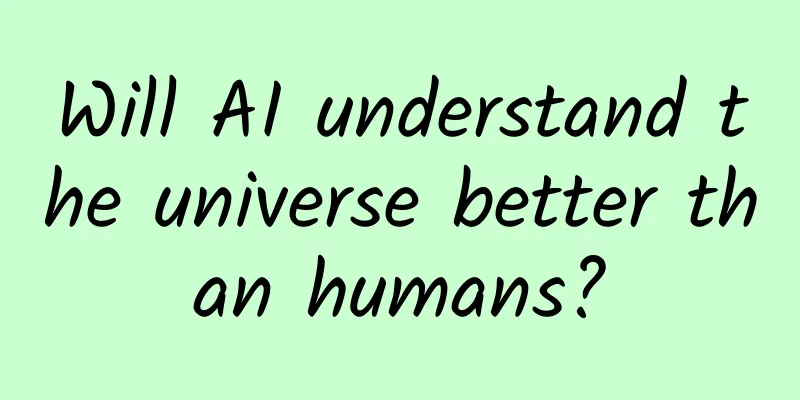Will AI understand the universe better than humans?

|
With the ability to quickly and accurately process, analyze, and simulate large amounts of data, AI can help scientists identify and detect data that humans may not be able to immediately understand, and then make predictions, which is expected to revolutionize our understanding of the universe. Wu Jiaji Professor, School of Electronic Engineering, Xidian University Recently, Elon Musk officially announced the establishment of xAI, an artificial intelligence (AI) company, whose primary purpose is to try to understand the universe and focus on answering deep scientific questions. In the vast universe, the unknown seems to always outweigh the known. So, can AI help humans understand the universe? What are the technical routes for AI to help humans understand the universe? In the future, how will AI and humans play their respective advantages to make the road of human scientific exploration smoother? Can self-learn and self-evolve like living organisms "From the atomic nucleus to the birth of the universe, these all belong to the category of the nature of the universe. Musk announced the establishment of xAI with the goal of understanding the nature of the universe, so the AI he hopes to create must have a deeper and more basic level of wisdom than all other AI competitors." Recently, Wu Jiaji, a professor at the School of Electronic Engineering of Xidian University, said in an interview with Science and Technology Daily. In Musk's view, this competitor is largely generative AI such as ChatGPT. Many generative AIs can answer questions raised by humans, so how do they differ in technical principles from the AI that Musk envisions as being able to understand the universe? Wu Jiaji explained that generative AI mainly generates new data by learning and extracting patterns from samples. It focuses more on predicting and generating natural language. It is widely used in fields such as text or images, but its depth and breadth are relatively limited. AI that can understand the universe must not only be able to generate new data, but also pay attention to how to deeply understand and analyze various information in the universe, the laws of development of things, and the complete structure of things. Its depth and breadth are relatively deeper and larger. This requires AI to have a stronger level of intelligence and generalization ability, as well as a higher level of cognition and "imagination". However, AI does not have the ability to think. How can AI without the ability to think deeply understand various problems and help humans explore the laws of development of things? "The reason why people think that AI does not have the ability to think is that previous AIs were trained based on a large amount of existing data and could not break through the knowledge boundaries built on the basis of the training data. However, the AI envisioned by Musk may use a combined recurrent neural network (RCNN), which can enable AI to self-learn and continuously 'evolve' like biological organisms, thereby surging with unpredictable self-inspiration capabilities and even the ability to solve unknown problems," said Wu Jiaji. So, what conditions must be met for AI to have these capabilities? Wu Jiaji believes that this requires the support of a large amount of data, perfect algorithms, and strong computing and storage capabilities. Data is the "feed" of AI, and AI needs data to conduct deep learning; autonomous and adaptive algorithms are the key to AI's deep understanding and analysis of various complex information and laws in the universe; strong computing and storage capabilities are the "logistics support" of AI and the foundation for AI to exert its due capabilities. With these conditions, we can initially build an AI that can understand the universe. There are two technical routes to train AI that can understand the universe The universe is vast and complex. In order to understand the nature of the universe, scientists need to analyze large amounts of data from telescopes, satellites, and other observation instruments, and analyzing and processing data is exactly what AI is good at. "With the ability to quickly and accurately process, analyze and simulate large amounts of data, AI can help scientists identify and detect data that humans may not be able to immediately understand, and then make predictions, which is expected to completely change our understanding of the universe. At the same time, considering that there is a large amount of unobservable dark matter in the universe, scientists may need to use AI with certain heuristic learning and creative capabilities to conduct hypothetical thought experiments." Wu Jiaji said. For example, astronomers try to build cosmic models to explain the origin, evolution and structure of the universe. However, due to the current computing power limitations, various cosmic models can only describe it with limited features, which is not accurate for the vast universe. Wu Jiaji pointed out that if we use the idea of AI for Science (i.e., scientific research driven by artificial intelligence), by combining existing astronomical observation data and artificial intelligence technology, it is possible to explore new cosmic models. This model has very good representation and generalization capabilities, and can self-learn and evolve without a large amount of data labeling. So, what are the technical routes to train AI that can understand the universe? Wu Jiaji said that embodied intelligence and brain intelligence are two technical routes with great potential. Embodied intelligence is a comprehensive intelligent entity that can actively interact with and learn from real or virtual environments like humans, rather than just learning from pre-prepared data. Embodied intelligence will have stronger logical reasoning capabilities, reduce the possibility of AI uncontrollably outputting content that humans don't want, and more accurately interpret and simulate the real world. However, the implementation of this technical route requires a large amount of virtual and real data and computing resources, and the training and testing speed of the model is slow. Brain intelligence is a digital version of the "human brain" built by simulating the neural network structure and function of the human brain. It can enable large models to have perception, cognition and decision-making capabilities similar to humans, but this technical route requires solving many complex biological and neuroscience problems, and the construction and training of the model also requires a lot of computing resources, which is still under exploration. There are still many difficulties in achieving the goal of "AI understanding the universe" "Currently, computer simulation technology is an important way for astronomers to understand the universe. However, it is very difficult to simulate a universe that has evolved for more than 13 billion years using only computers because there are countless variables to consider. Similarly, if we want to achieve the goal of 'AI understanding the universe', the computing power required may be unimaginably large." said Tan Mingzhou, director of the Artificial Intelligence Division of Yuanwang Think Tank and chief strategy officer of Turing Robotics. Tan Mingzhou said that in addition to the difficulty of computing power, if we rely too much on observational data or simulation data to train AI, it may also lead to deviations in our understanding of the universe. As with any scientific tool, it is very important to combine AI with other methods to ensure the accuracy of the results. In the process of AI understanding the universe, human participation is essential. Wherever there are people, it is necessary to ensure that AI's behavior complies with the moral, ethical and legal requirements of human society to protect the basic rights and dignity of human beings. Tan Mingzhou emphasized that we need to formulate a set of moral and ethical guidelines and corresponding legal and regulatory measures for AI to understand the universe based on human society to ensure that AI's behavior is consistent with human values and moral principles. At the same time, we should also study privacy and data protection technologies for new social forms, as well as technologies for improving the transparency and explainability of model algorithms. If AI can understand the universe, does it mean that it has surpassed humans? Tan Mingzhou pointed out that if AI can truly understand the universe, it may indeed surpass humans in aspects such as data storage and data mining, but only in these aspects. This is because AI has a natural advantage in processing and analyzing large amounts of data, but in terms of creativity, emotional experience, perceptual decision-making, etc., there is still a large gap between it and humans. Humans and AI can learn from each other's strengths and weaknesses, and jointly play their respective advantages to ultimately achieve sustainable development of human society. Related links AI is already showing its power in astronomical research Today, astronomers are using a variety of technologies to study the mysteries of the universe, and AI is one of them. Some people believe that AI and astronomy are a perfect match, because AI needs a lot of data to learn, and a large amount of astronomical observation data can just satisfy AI's appetite. One area of astronomy where AI is making a big splash is in the search for exoplanets. Using libraries of observed light curves, astronomers have been able to develop machine learning-based models that may outperform humans in the search for exoplanets. AI can not only discover exoplanets, but it can also expand astronomers’ knowledge of exoplanets. Based on a large amount of training data, AI can also generate galaxy images. It is understood that OpenAI has developed a series of models that generate galaxy images based on written prompts. The authenticity of these models is often difficult for many excellent astronomers to distinguish. It is said that these generated galaxy images can be used to simulate and predict the evolution of the universe, and can also be used to train AI algorithms that analyze and process interstellar data. Source: Science and Technology Daily |
<<: Why are duck eggs always pickled? The reason is...
>>: Wang Chengshu: The "Three Plum Blossoms" in the Nuclear Physics Community
Recommend
Jieyoushe's "Love Guide" upgrades the cognition of love and popularizes the correct values of love
Course Contents: 01Love is easy.mp4 02 Preparatio...
Why does Xiaomi want to make high-end phones?
At the beginning of the month, Xiaomi held a prod...
5 major application trends that mobile game developers need to pay attention to
He likes to write about technology, marketing and...
Is sleepwalking a dream? Why do we sleepwalk while we are asleep?
When it comes to sleepwalking, you might think of...
Five motivations for users to follow TikTok
How can you attract Douyin users and become an in...
Masters' Battle: Sima Yi's Four Survival Philosophies
Zhang Jinyang—— One of the top ten female lecture...
Actually, we are all stars.
© CC BY 4.0 Leviathan Press: I forgot where I saw...
How does Metaverse Marketing change the advertising industry?
With Facebook changing its name to Meta, the conc...
You must try this crispy and tender ivory vegetable once!
In addition to enjoying the flowers blooming all ...
How to quickly attract fans through local WeChat public account promotion?
We know that having a local WeChat public account...
A powerful assistant for surgery, coming from the International Space Station?
Aerospace technology is inseparable from medical ...
Google launches startup accelerator to help startups develop mobile products
According to foreign media VentureBeat, Google ha...
24%! Porsche's sales plummeted, and so did the brand recognition of Chinese high-end car owners.
Recently, Porsche China issued a joint statement ...
Apple iOS 9 official version released (including download address)
In the early morning of September 17, Apple annou...
A comprehensive analysis of Tik Tok’s private domain!
Let’s start with the time and a speech. Four mont...









